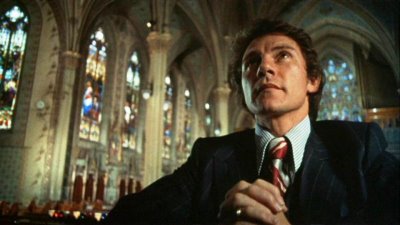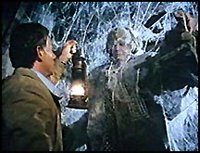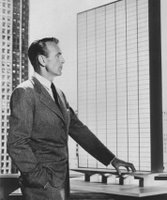Kenji Fujishima
 If I had to name one film that had the effect of turning me onto the power of movies for good, Martin Scorsese’s Mean Streets would be that film. Before Mean Streets, my movie diet mostly consisted of horror: cheesy (1970s ABC television horror flicks like Curse of the Black Widow in addition to less-cheesy affairs like The Night Stalker and Trilogy of Terror), gruesome (Friday the 13th and other early 1980s Halloween ripoffs like Happy Birthday to Me or The Burning), not-so-cheesy-yet-still-gruesome (Nightmare on Elm Street, Scream) or neither-cheesy-nor-gruesome (Psycho, Halloween). Whenever
If I had to name one film that had the effect of turning me onto the power of movies for good, Martin Scorsese’s Mean Streets would be that film. Before Mean Streets, my movie diet mostly consisted of horror: cheesy (1970s ABC television horror flicks like Curse of the Black Widow in addition to less-cheesy affairs like The Night Stalker and Trilogy of Terror), gruesome (Friday the 13th and other early 1980s Halloween ripoffs like Happy Birthday to Me or The Burning), not-so-cheesy-yet-still-gruesome (Nightmare on Elm Street, Scream) or neither-cheesy-nor-gruesome (Psycho, Halloween). Whenever  I went to a video store, I’d experience much more of a dirty thrill standing in the midst of the horror section, with box after box of forbidden images beckoning me to rent them and see what horrifying sights they held. (My addiction to the TV series The X-Files fueled my taste, with its relatively tame yet no less freaky and disturbing glimpses into the supernatural. Flukemen, anybody?)
I went to a video store, I’d experience much more of a dirty thrill standing in the midst of the horror section, with box after box of forbidden images beckoning me to rent them and see what horrifying sights they held. (My addiction to the TV series The X-Files fueled my taste, with its relatively tame yet no less freaky and disturbing glimpses into the supernatural. Flukemen, anybody?)Then I saw Mean Streets on video in junior high school. Boy, I had never seen a film as sharply realistic and seemingly lived-in as that one. It was as if I was witnessing a few characters’ real lives right in front of my eyes. (Of course, only later would I be able to appreciate Scorsese’s visual stylization: his flaming reds to suggest characters in the hellfire of sin.) At that point, I realized that movies didn’t just have to be imaginative, dark and fantastical; they could touch upon and perhaps even recreate something approaching real life in front of the camera.
But I didn’t just happen to decide on a whim one day to rent Mean Streets from my local library. I was advised to do so from…who else? Pauline Kael, whose impassioned review I credit with leading me to that personal breakthrough.
 It is thanks to Pauline Kael — whose For Keeps I had picked up at random before then at that same local library — that I began to develop an interest in film criticism. After watching Mean Streets, I excitedly went back to her review, and I realized how much more she had been able to grasp from the film: its visual stylization suggesting characters in the hellfire of sin, its view of Charlie as tinged with guilt. Even though I was young, I still thought to myself: Wow, I didn’t get all that.
It is thanks to Pauline Kael — whose For Keeps I had picked up at random before then at that same local library — that I began to develop an interest in film criticism. After watching Mean Streets, I excitedly went back to her review, and I realized how much more she had been able to grasp from the film: its visual stylization suggesting characters in the hellfire of sin, its view of Charlie as tinged with guilt. Even though I was young, I still thought to myself: Wow, I didn’t get all that.From then on, I resolved to aspire to that kind of wisdom and insight about movies. I read Kael and other critics voraciously. I borrowed film-related fiction and nonfiction books relatively frequently from my local library. And, of course, I kept watching movies, often turning to online or print reviews after watching a particular film to challenge or confirm my own half-formed thoughts on that film, perhaps to better understand what I had just seen and how I felt about it.
In fact, as a soon-to-be-21-year-old wannabe film critic, I’m still doing most of those things, still actively engaged in a self-learning process, still trying to find my voice and figure out my critical interests.
 Why am I interested in becoming a film critic? Well, I could try to provide some noble public-service type of answer: that, with in-depth knowledge of movie history and technique, I’m trying to help receptive readers better understand why they may react a certain way to a particular film, or maybe even try to challenge readers to reexamine those reactions. I suppose that is a part of the reason why I’m interested in writing about film, maybe the most important art form of our time. But — at the risk of sounding a bit too much like Howard Roark — I’m not doing it for the people or for the public service. I do it because I take pleasure out of it. I do it because I love movies and I want to share my enthusiasm or disgust about a movie with others who are willing to listen. And I do it, frankly, because I think I’m good at it and that I have something to offer with every movie I write about. Personally, I think those are the kinds of reasons that matter most. If you’re looking for fame or power in the film critic business, then most likely you’re in for a rude awakening; not everyone can achieve Roger Ebert-level success. In my freshman year of college, I was always told that I should do what I felt passionate about. Because I feel passionate about movies…well, here I am.
Why am I interested in becoming a film critic? Well, I could try to provide some noble public-service type of answer: that, with in-depth knowledge of movie history and technique, I’m trying to help receptive readers better understand why they may react a certain way to a particular film, or maybe even try to challenge readers to reexamine those reactions. I suppose that is a part of the reason why I’m interested in writing about film, maybe the most important art form of our time. But — at the risk of sounding a bit too much like Howard Roark — I’m not doing it for the people or for the public service. I do it because I take pleasure out of it. I do it because I love movies and I want to share my enthusiasm or disgust about a movie with others who are willing to listen. And I do it, frankly, because I think I’m good at it and that I have something to offer with every movie I write about. Personally, I think those are the kinds of reasons that matter most. If you’re looking for fame or power in the film critic business, then most likely you’re in for a rude awakening; not everyone can achieve Roger Ebert-level success. In my freshman year of college, I was always told that I should do what I felt passionate about. Because I feel passionate about movies…well, here I am._________________________________________________
Kenji Fujishima is a contributor to The House Next Door, a Rutgers University journalism student and the publisher of My Life at 24 Frames Per Second.

0 Comments:
Post a Comment
<< Home